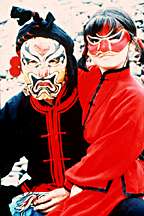FILM NOTES
FILM NOTES INDEX
NYS WRITERS INSTITUTE
HOME PAGE

 King of Masks (Bian Lian)
King of Masks (Bian Lian)
(Chinese, 1996, 101 minutes, color, 35mm)
In Mandarin with English subtitles
Directed by Tian-Ming Wu
Cast:
Zhigang Zhang. . . . . . . . . . Luo, Sulan
Renying Zhou . . . . . . . . . . Gouwa
Xu Zhu . . . . . . . . . .Bianlian Wang
The
following film notes were prepared for the New York State Writers
Institute by Kevin Jack Hagopian, Senior Lecturer in Media Studies
at Pennsylvania State University:
In a small town in Sichuan, in the 1920's, an artist known as the King of Changing Faces plans to give away the only thing of real value he owns: the secret way of the faces. He lives on a boat, his only companion a monkey. He is old, and fears that death may overtake him before he can invent an heir to his magical legacy. At an auction, he takes a young "grandson," "Gouwa" (Zhou Renying), secure in the knowledge that the key to the faces will now go on after him. But Zhou is not what he seems, and the King discovers that faces do not only change at shows in the marketplace.
An award winner at the Tokyo film festival as well as at Chinese festivals, Wu Tianming's essay in Confucianism is a celebrated work in a remarkable career. Wu Tianming owns an enviable career in both the art cinema and the mainstream film industry, a measure of his ability to tap broadly felt sentiments in ways that are narratively and stylistically challenging. He was born in 1939, and his home base for many years was the Xi'an Studio, where he began as an actor in early 1960's, and where as well he eventually began to direct. By 1976, he was deputy director of the studio, and in 1983, he was elected Xi'an's chief. It was as a production head at Xi'an that he made perhaps his most famous contributions to world cinema, overseeing both production of KING OF THE CHILDREN by director Chen Kaige, and the breakthrough work RED SORGHUM, by Zhang Yimou, in 1987. He schooled the studio's directors in a remarkable combination of social criticism and a rich visual style, both presented in thrilling popular narratives. He virtually coined the Chinese Western as a currency for exploring the mythic dimensions of the Chinese landscape, and in his own directing career, Wu Tianming began to speculate (dangerously, it turned out) on the recent history of China. REVERBERATIONS OF LIFE, which he co-directed with Teng Wenji in 1979, was a polemic against the "Gang of Four" who had made the Cultural Revolution such a national tragedy. His 1983 feature THE RIVER WITHOUT BUOYS was also a politically critical work. In LIFE (1984), he turned a careful eye to the shifting balance between the fabled countryside of China's ancient imagination and the troubled urban realities of its present. All of his works use Chinese folk art and family history as a deep current, like THE OLD WELL (1987). And in each, there is always present a questioning of national policy, a small but insistent voice asking, "Could we have done better?" and "Will be able to do better?" Ever the diplomat, Wu Tianming was able to keep his studio operating, and his directors relatively free from interference, but when the atmosphere for political criticism, however allegorical, became suddenly thinner in 1989, he left for the U.S., coming to live in Los Angeles. THE KING OF MASKS marked his return to China for this co-production with the legendary Shaw Brothers of Hong Kong. However ambivalent he was about his return, Wu Tianming's homecoming was welcomed by a nation whose moviegoing populace rightly regard him as a treasured interpreter of their unique past.
— Kevin Hagopian, Penn State University
For additional information, contact the Writers Institute at 518-442-5620 or online at https://www.albany.edu/writers-inst.